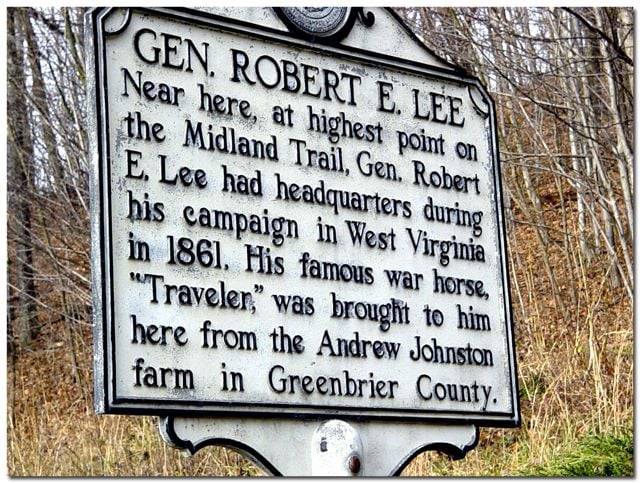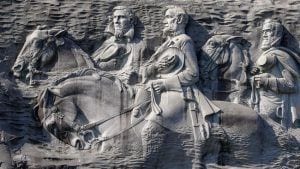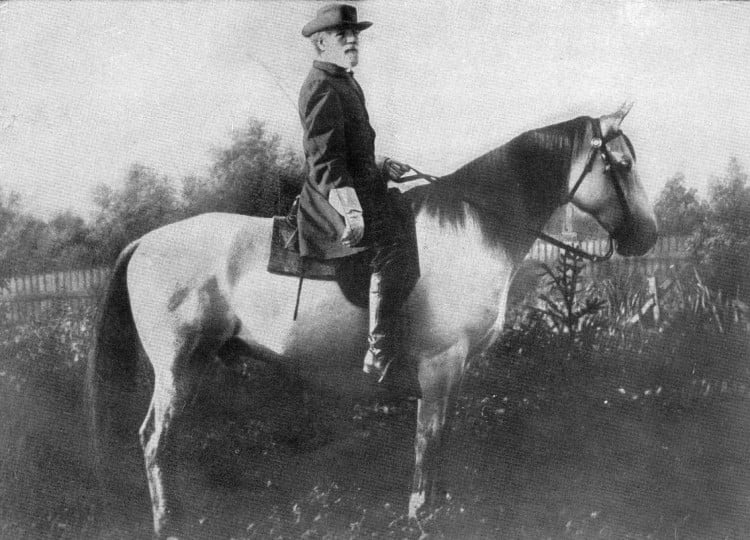A high spirited and handsome young colt with the name “Jeff Davis” seemed destined for greatness. And he certainly was. Described as a flashy dappled grey horse with a black mane and tail, he was striking and regal.
When Confederate General Robert E. Lee spotted the colt in the Virginia mountains, he knew he had to have him. Lee later renamed him “Traveller” because of the horse’s ability and eagerness to walk quickly. They would would ride over 40 miles a day during campaigns. Lee rode a number of horses during the war, but Traveller was by far his favorite.


Traveller was difficult, high strung, a bit unruly, “pranced or jigged wherever he went.” One day Traveller reared when surprised by artillery fire. Just at that very moment, “a cannon ball passed directly under the steed’s belly,” saving his own and General Lee’s life.
Recounts of battle action include this story:
“Some of the most dramatic incidents involving Lee and Traveller occurred during the Overland campaign in 1864, when soldiers literally grabbed the horse’s reins to prevent their commander from personally leading attacks on six occasions…”
“The most notable incident occurred in the Wilderness…, when soldiers of the Texas Brigade surrounded Traveller and shouted, ‘Lee to the rear!’ That day Traveller carried Lee until well after midnight, and when they finally returned to camp, Lee dismounted, and overcome with exhaustion, he threw his arms around Traveller’s neck to hold himself up.”
It seems the love and respect between man and beast was mutual. Here’s what Traveller thought about Lee in this recount. One day Lee escorted his daughter’s friend back to the boat dock.
“He dismounted, tied Traveller to a post, and was standing on the boat making his adieux, when someone called out that Traveller was loose. Sure enough, the gallant grey was making his way up the road, increasing his speed as a number of boys and men tried to stop him.”
“General Lee immediately stepped ashore, called to the crowd to stand still, and advancing a few steps gave a peculiar low whistle. At the first sound, Traveller stopped and pricked up his ears. The General whistled a second time, and the horse with a glad whinny turned and trotted quietly back to his master, who patted and coaxed him before tying him up again.”
“To a bystander expressing surprise at the creature’s docility the General observed that he did not see how any man could ride a horse for any length of time without a perfect understanding being established between them.”
Traveller served the General well in battle after battle, throughout the entire war, coming through relatively unscathed. Traveller became increasingly famous after the war. Even his hair was a sought after memento of the war. Lee wrote to his daughter,
“The boys are plucking out his tail, and he is presenting the appearance of a plucked chicken.” While travelling, he would write home and ask, “How is Traveller? Tell him I miss him dreadfully,” Lee would ride his famous grey gelding for the rest of his life.
One of the most famous images of General Robert E. Lee was taken astride Traveller, “a Confederate grey.”
Traveller outlived Lee by a year. The stable where he lived his last days stood with its doors left open to “allow Traveller’s spirit to wander freely as he did when he was alive.” They are painted in “Traveller Green.” His remains are buried a few feet away from where his master’s body rests.
“The great Traveller was considered gorgeous and difficult. But, he was greatly loved, and still is.”


